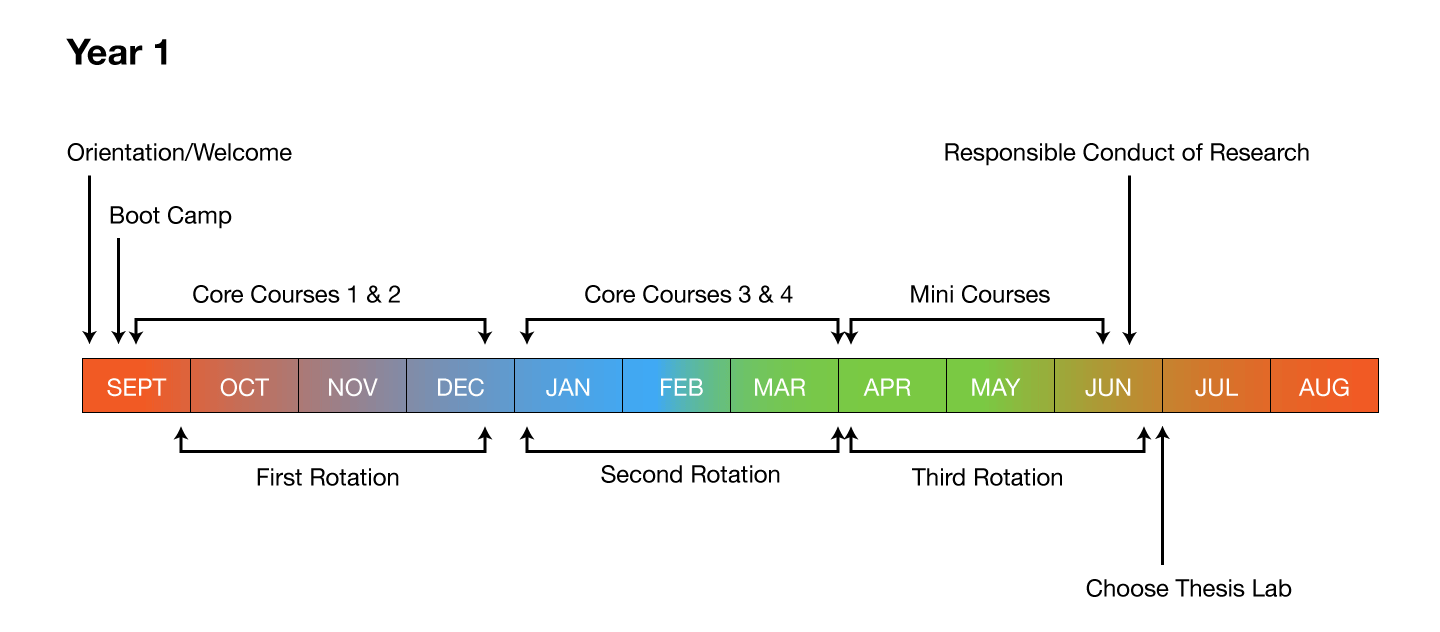Modern biological research requires creative synergy between different disciplines. The Tetrad curriculum provides students with a strong foundation in the basic concepts of biochemistry, genetics, developmental biology and cell biology through interactive courses. In the spring quarter, students choose three two-week long, discussion-based mini-courses that focus on a particular problem and encourage students to synthesize concepts from different disciplines to tackle the problem.
Fall Quarter
Workshops
We realize that our incoming students come from a wide variety of experimental backgrounds, so the first year begins with a week long series of intensive hands-on workshops on cutting-edge concepts and experimental techniques that will be useful in a modern biomedical research lab. In 2021 the two modules were:
- MIcroscopy: an introduction to light microscopy, going from the optical light path to super-resolution microscopy, providing an opportunity to demystify the theory and practice for microscopy technologies available on campus.
- Biostatistics: a crash course in biostatistics and how to use R via Rstudio to carry out and visually present statistical analyses.
Structure of Macromolecules
Focuses on the aspects of thermodynamics, kinetics, and structure that allow us to understand the molecular basis of biological processes. The course is intended to: (1) provide students with an intellectual framework for understanding the behavior of biological macromolecules, and (2) introduce students to practical methods for purifying and studying these molecules.
Cell Biology
The course is based on class discussions of selected exciting papers in cell biology. Particular emphasis will be placed on emerging concepts concerning cell organization, structure and function and on how complex problems can be approached experimentally. This course has a research proposal as its final exam.
Racism in Science
This introductory course provides the historical background of systemic racism in scientific research. It explores the relationship between notions of race and science and how scientific research has been informed by and perpetuates anti-Black racism. This course also examines the impact of bias and a lack of diversity in science and ways in which to address these deficiencies. Students will learn the principles of social justice-oriented scientific research and its potential.
Winter Quarter
Biological Regulatory Mechanisms
Provides a foundation in basic molecular biology through lectures, particularly in fields related to DNA replication, transcription, RNA processing, and translation. Like all the courses in the first year, this course helps students shift from the notion of science as a series of "facts" in a textbook to science as a series of imperfect experiments whose results compete to provide the most likely interpretations that are integrated into fallible and mutable models. This is accomplished by in-depth discussion of key papers. Students defend a research proposal for their final exam.
Principles in Molecular Genetics
Lectures and discussion sessions provide an in-depth analysis of genetic mechanisms with an emphasis on modern genetic concepts and methods used to study the most widely used model organisms, ranging from prokaryotes to higher eukaryotes. Topics include recombination, mutagenesis, gene expression, meiotic and mitotic segregation, and developmental genetics.
Spring Quarter
Minicourses
During the third quarter, each student takes three mini-courses that are each 2-3 weeks long. During the course, a small group of students meets daily for several hours with two faculty members for in-depth discussions of research articles in a specific area. These discussions help students understand how to choose an important research problem and how to develop a research program to solve it.
Examples of Mini-courses taught by Tetrad faculty in 2020:
- Inheritance and Maintenance of Cell Fate: Barbara Panning and Noelle L'Etoile
- Science Communication: Wallace Marshall & Jennifer Frazier
- Protein Quality Control: Peter Walter & Shaeri Mukherjee
- Principles in Virology: Raul Andino
- Protein Homeostasis Network in Disease and Health: Martin Kampmann & David Agard
- Cryo-EM: Adam Frost, Dan Southworth, Yifan Cheng
- The CRISPR Revolution: Michael McManus, Joe Bondy-Denomy, Luke Gilbert
- Classic Papers in Biology: Bruce Alberts & Danica Fujimori
- Peer Review in Life Science: James Fraser
- COVID-19: Anatomy of a Pandemic: Joanne Engel
Responsible Conduct of Research for Basic Scientists
This course covers topics related to the responsible conduct of research such as conflicts of interest, responsible authorship, policies regarding the use of human and animal subjects, handling misconduct, proper data management, research funding rules and procedures. Students will review and present case studies for class and online discussion, and submit written reports.
